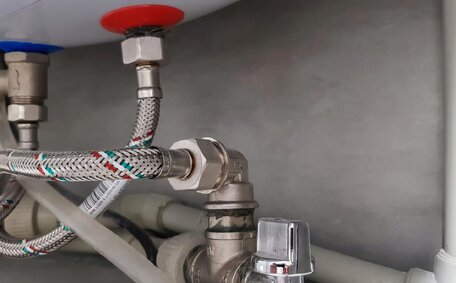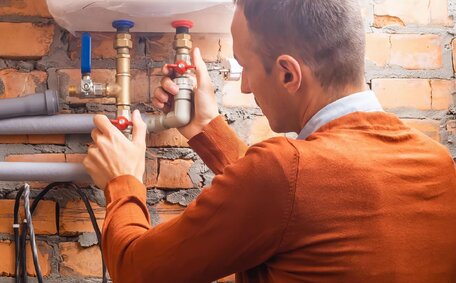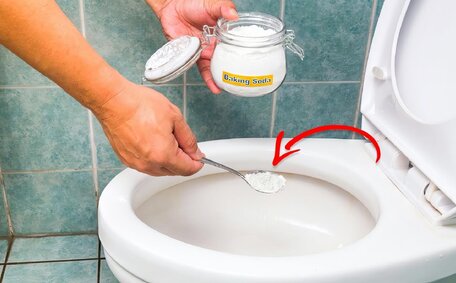Introduction to Noisy Water Pipes
Noisy pipes can be a significant annoyance in any household. Loud banging or knocking sounds emanating from your plumbing system when you turn water on or off often indicate an underlying issue that needs attention. Understanding what causes noisy water pipes and how to address them is key to maintaining a properly functioning plumbing system.
As experienced plumbers serving North Epping, Sydney for over 10 years, North Epping Plumbing is conversant with the most common causes of noisy pipes in your household. In this comprehensive guide, we analyse the potential sources of noise and provide practical troubleshooting tips for homeowners to inspect their water line and other areas before calling a professional plumber.
Identifying and resolving noisy pipe issues prevents costly repairs and ensures a smooth-running plumbing system. Continue reading for expert insights on quieting noisy pipes and maintaining optimal water flow in your North Epping residence.
Water Hammer - The Sudden Loud Banging Noise
Water hammers, also known as hydraulic shock, refer to the loud banging or knocking noise that occurs when water flow through pipes is abruptly stopped. A swift closure of a faucet valve generates a shockwave, causing the moving water to halt abruptly.
The shockwave moves rapidly through your pipes, violently rattling them against joists or studs, which can lead to pipe fatigue and result in leaks or burst pipes over time. The banging noise is produced as the pipes vibrate from the force of the shockwave within your walls.
Water hammer typically occurs when water is shut off abruptly, particularly when hot water is in use, at the valve for taps or appliances connected to a water supply line. Common culprits include washing machines, dishwashers, toilets, and shut-off valves. The intensity of the shockwave increases with the speed of water flow through your pipes.
Installing hammer arrestors or pressure regulators can prevent the cacophonous clatter known as water hammer in hot water systems. Water hammer arrestors, which can absorb the shockwave and dissipate its energy before it travels through and damages your hot water heater pipes. Pressure regulators ensure steady, optimal water flow to your heater at a controlled pressure.
If you’re experiencing persistent water hammer issues, a licensed plumber can inspect and repair your noisy water pipes. They’ll conduct a diagnosis and address any problematic areas to restore peace to your plumbing system.
Causes of Water Hammer
In addition to the abrupt cessation of water flow, other factors contributing to water hammer in home plumbing include:
- High water pressure - Excessive pressure entering your home can intensify water hammers. Pressure can also escalate to risky levels beyond 80 PSI, putting undue stress on pipes and inducing the noisy phenomenon of water hammer.
- Worn washers and seals - Over time, the washers and seals inside faucets and valves wear out. This condition permits drips to persist, as it allows water leaks through even when the valve is closed, promoting rattling sounds.
- Loose pipes - If pipes are loosely secured, the shockwave from water hammer can make pipes knock around violently. Ensuring pipes are properly secured helps minimise movement that could otherwise cause damage to your plumbing infrastructure.
- Trapped air - Pockets of trapped air can amplify the shockwave, letting it reverberate more intensely through the pipes.
- Faulty pressure regulator - A faulty pressure regulator can allow water to enter the home at higher than normal pressure. Swapping out defective units can actually help in averting water hammer issues.
How to Fix Water Hammer
Here are some steps you can take to fix water hammer in your plumbing system:
- Find your main water line’s shutoff valve and turn off the water supply completely. This will cease all running water flowing into your pipes while you attend to maintenance.
- Open the taps nearest to the water meter to drain the pipes.
- Examine your pipes for any leaks, eroded washers or insecure pipes and mend them, especially when shut off from the water supply. Tighten any loose pipe connections.
- A professional can install a specialised device, known as a water hammer arrestor, near appliances like washing machines and dishwashers to alleviate the problem. These provide shock absorption.
- Implement a pressure regulator, easily monitored with a pressure gauge, if the psi reading of your home’s water pressure exceeds 80. This controls excess pressure coming into your home.
- Add air chambers, also known as air cushions, to your water supply lines - this helps cushion hydraulic shock waves.
- Engage in a preemptive measure to check your pressure regulators for faults, faucet washers for wear, and fill valves for leak or drip causation.
- Insulate pipes susceptible to pipe noises to muffle sounds.
- Consider re-piping old piping systems that are beyond repair.
- It would be prudent to call a plumber if grappling with severe, relentless water hammer tribulations.
Fixing water hammer may require multiple strategies. North Epping Plumbing has the expertise to diagnose your specific cause and implement the right solution to stop the banging noise and protect your plumbing system.
Loose, Shaking, or Rattling Pipes
Loose, shaking, or rattling pipes are also common sources of annoying noise in plumbing systems. This type of noise occurs when pipes have become loose and are able to move slightly when water passes through them.
There are a few common causes of noisy, loose or shaking pipes:
- Improper installation - Incorrectly secured pipes to joists or studs can lead to rattling over time.
- shifting or settling of your home can dislodge pipe attachments.
- Corrosion - Metal pipes deteriorated by rust can cause water pipes to loosen and noise to emerge.
- High water pressure can lead to a scenario where pipes knock around with startling ferocity.
- Old piping - Old copper pipes are prone to corrosion and loosening.
For loose or rattling pipes, seek help from a licensed plumber to inspect and secure your piping system. The installation of water hammer arrestors can also mitigate the issue by stabilising pressure. For longstanding solutions, particularly with both cold and hot water lines, consider re-piping to eliminate persistent noise.
Causes of Loose or Shaking Pipes
- Improper mounting - Pipes that are not properly secured to studs or joists can eventually work loose and begin to shake.
- Corroded fittings - Corrosion around pipe joints and fittings can cause them to deteriorate, leading to a loose connection.
- Excess water flow - High water pressure or volume passing through pipes not rated for it can cause vibration and shaking.
- Settling home - If your home’s foundation shifts over time, it can dislodge pipes from their mounts.
- Old pipes - Old galvanised steel pipes are prone to corrosion and loosening at joints.
A licenced plumber from North Epping Plumbing can assess and fix areas causing loose, shaking pipes. We can re-secure loose sections, replace corroded pipes, add supports to prevent movement, and install water hammer arrestors to control pressure and water hammer issues.
For persistent noises in your old pipes where water flows, complete re-piping may be the best long-term solution. Contact our team if you need assistance pinpointing and fixing the causes of noisy, shaking pipes in your North Epping home’s plumbing.
Corroded fittings - Corrosion around pipe jointss water flow - High water pressure or volume passing through pipes not rated for it can cause vibration and shaking.How to Fix Rattling or Shaking Pipes
Should you encounter rattling or shaking from your pipes, consider these DIY steps before seeking professional help:
- Stop water flow through your pipes by turning off the main water supply to your home.
- Check for any loose pipe connections, fittings or sections of pipe not properly secured. Tighten any loose joints with a pipe wrench.
- Add pipe clamps, brackets or hangers to secure pipes to studs or joists if needed. This will minimise vibration and noise.
- Replace any corroded, damaged or worn pipe sections or fittings that may be causing the noise.
- Acknowledging that vibration-related disturbances can occur, consider wrapping noisy pipes in insulation to mute resonating sounds.
- Install water hammer arrestors if water hammer seems to be an issue.
- Seeking out the most effective way to fix the cacophony, re-piping may be a sound solution for persistent rattling in your noisy water pipes.
Tighten any loosves are another common source of noise from pipes. As these internal parts wear down over time, they can cause leaks and drips even when the valve is completely closed. This allows a small amount of water to continue flowing through, which creates a rattling or knocking sound as the valve vibrates from the water movement. Replacing old washers and seals helps stop the water drips and resolve the noise.
Faulty fill valves in toilets can create noises your ears pick up when the water stops sealing properly as the toilet fills. A noisy toilet that you might hear continuing to run intermittently usually indicates a bad fill valve in need of replacement.
Make it a habit to periodically inspect the washers, seals, and internal fill valves inside your plumbing fixtures. Replacing worn parts before they fail completely will prevent annoying dripping noises and save water.
- Dripping faucet - A faucet that drips after being turned off is a clear sign of a worn washer that needs replacement.
- Leaky toilet - If your toilet continues to run intermittently after flushing, the fill valve likely needs to be replaced.
- Sputtering flow - Inconsistent water flow from faucets points to worn washers not sealing properly.
- Knocking pipes - Persistent knocking noises coming from pipes when water is flowing signals an issue with worn seals.
- High water bills - Worn parts that leak can substantially increase your water usage and bills.
Catching these signs early and replacing worn washers and parts can restore proper function, prevent bigger leaks, and stop the annoying noises caused by faulty plumbing parts. Our team at North Epping Plumbing has the expertise to diagnose issues and repair or replace worn plumbing parts.
- Knocking pipes - PerReplacing Washers and Parts to Fix Noisy Pipes
- Turn off the main water supply before attempting any repairs.
- For a dripping faucet, unscrew the faucet stem and pull out the washer. Replace it with a new washer of the same size and material.
- For a running toilet, shut off the water supply to the toilet and flush to drain the tank. Unclip the fill valve assembly and replace it with a new matching fill valve.
- For sputtering or inconsistent flow in your water lines, replace the faucet washers using the steps above.
- Make sure all parts are tightened properly when reassembling fixtures to prevent further leaks.
- Gently restore the flow by turning the main off water supply back on and inspect for any persistent drip or leakage.
- Call a professional plumber if you have difficulty determining the cause of noise or replacing worn parts.
Replacing small but vital rubber washers and faulty fill valves yourself can restore quiet operation and prevent major leaks. Contact the team at North Epping Plumbing if you need assistance diagnosing or repairing the source of noise from worn plumbing parts.
Replacing Washers and Parts to Fix Noisy Pipes
When to Call a Professional Plumber
- If the noise persists despite DIY fixes and occurs with other plumbing issues, such as low water pressure, leaks or bursts. There may be a deeper problem needing professional attention.
- The noise started suddenly and loudly throughout your house without any apparent reason.
- You have very old pipes that are deteriorating.
- You lack the tools, skills or confidence to attempt DIY repairs on your plumbing system.
For assistance with persistent noise or other plumbing issues in your North Epping residence, reach out to us at 1300 349 338 or via email at [email protected]. Our skilled team is ready to solve your plumbing concerns and ensure a quiet, efficient water system.
Preventing Noisy Pipes
Making some simple changes can help prevent noisy pipes and avoid the nuisance of loud banging or rattling sounds from your plumbing system.
- Schedule an annual inspection of your pipes and water pressure by a licenced plumber to identify and address potential issues early.
- Install water hammer arrestors near problem areas prone to causing no studs or joists to avoid loosening and noise.
- Replace washers, seals, and parts as needed to stop drips and leaks that cause noise.
- Consider re-piping if dealing with corroded galvanised steel pipes.
- Maintain optimal water pressure around 50-60 PSI by installing pressure regulators.
- Insulate noisy pipes to dampen sounds effectively.
Being proactive with regular maintenance and integrating preventative strategies recommended by North Epping Plumbing can help avoid the annoyance of noisy pipes in your home’s plumbing system. Contact us if you need assistance keeping your pipes quiet and trouble-free.






